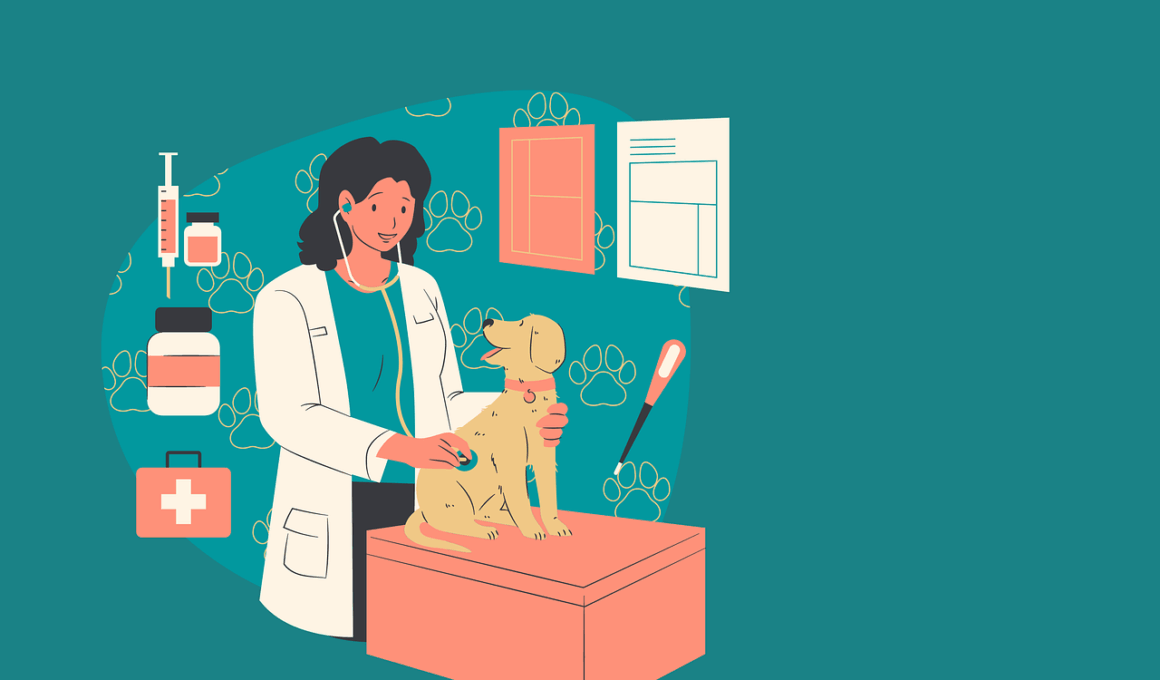Top 10 Questions to Ask Your Vet During Senior Dog Checkups
As our dogs age, regular vet visits become even more vital to their overall health. It’s crucial to come prepared with questions. Start by asking about your dog’s nutrition. Is their current diet appropriate for their age and health status? You can inquire about any recommended dietary changes. Additionally, ask if there are specific supplements for joints as older dogs are more prone to arthritis. Another important aspect is dental health; inquire how often you should have their teeth cleaned. Good oral hygiene can prevent serious health issues. You should also clarify vaccination protocols for senior dogs. It’s essential to find out which vaccines are necessary. Discuss any noticeable behavioral changes in your dog, as they can signal health issues. Ask about common senior dog diseases to monitor for signs. Regularly check your dog’s weight and ask about ideal weight ranges. Finally, don’t hesitate to ask about palliative care options. Understanding what to expect as your dog ages can provide peace of mind during this emotional time. Communication with your veterinarian is key to your pet’s wellbeing.
When your senior dog visits the vet, another significant area to address is pain management. Older dogs often suffer from chronic pain, which might not be immediately apparent. Therefore, ask your vet about recognizing signs of discomfort in dogs. This information can help you monitor your dog’s behavior and adjust their environment accordingly. You should also inquire about the best pain relief options available, considering their overall health and any existing conditions they might be managing. Don’t forget to ask about exercise recommendations—what type and intensity is suitable for your senior dog? Frequent quality exercises can help maintain quality of life and mobility. Understanding the right balance of rest and activity tailored to your dog’s needs is crucial. It’s also beneficial to discuss signs of cognitive decline. Dogs can suffer from dementia, which impacts their behavior. Seek guidance on how to recognize early signs and find effective strategies to support your pet’s mental health. Getting frequent updates from your vet keeps you informed about the best practices in senior care. Maintaining a strong relationship with your vet ensures your dog’s health remains a priority.
Understanding Senior Dog Health Challenges
Many owners often overlook the importance of oral health, yet it plays a critical role in overall wellness for senior pets. Your vet can provide insights on the proper dental care practices that you can implement at home. Regular dental check-ups can prevent painful infections and contribute to a healthier heart. It’s equally significant to ask about changes in your dog’s vision or hearing. As dogs age, senses can decline, leading to disorientation or anxiety. Understanding how to accommodate your furry friend’s diminishing senses can greatly improve their quality of life. Also, clarify how often you should bring your dog in for check-ups. Your veterinarian typically has recommendations based on breed and age. It’s not unheard of for senior dogs to need more frequent visits than younger ones. Ensure you discuss blood work and tests to monitor kidney and liver function, which can change with age. These tests often become more critical to catch issues early. Your vet should explain the rationale behind each test and any alterations based on the results. The more information you gain, the better you can care for your senior dog.
During your senior dog’s vet visits, it’s vital to inquire about skin and coat health. Aging pets may experience more skin issues, so ask your vet about what changes to watch for. Inquire about whether your pet’s grooming routine needs adjustments to keep their skin healthy and promote a shiny coat. Next, address their mental well-being during visits. Senior dogs face emotional challenges as they age. Ask about signs of anxiety and strategies to manage it effectively. Your veterinarian can guide you on maintaining an enriched environment through toys, companionship, and mental stimulation. Many times, medications or holistic approaches, like CBD, can help soothe anxiety. Also, it can be pertinent to discuss any new behavioral patterns. Changes in habits, such as eating or bathroom routines, can signify health concerns needing immediate attention. Your vet can help differentiate normal aging patterns from those that might indicate deeper troubles. Finally, always make sure to check your options for insurance or payment plans. Senior care can be costly, so understanding your financial options can help alleviate stress about budgeting for your dog’s needs.
Final Thoughts on Vet Visits for Senior Dogs
When attending vet visits with your senior dog, be proactive in gathering information about preventive care. Ask if there are specific screenings or tests your dog should have, especially as they continue to age. Regular screenings can allow early detection of diseases, significantly improving prognosis and quality of life. Understanding your dog’s breed-specific health risks is also essential for gauging the importance of certain tests. You can seek advice on how to prepare your dog for vet visits to ensure they are as comfortable as possible. This could include familiar items that make the trip less stressful. Most importantly, always discuss holistic care options. More pet owners are embracing natural remedies to accompany traditional veterinary treatment. Talk about alternative medicine practices such as acupuncture or dietary changes to support your pet’s aging process. Learn about local services that provide alternative treatments. It’s vital to integrate both conventional and holistic approaches to meet your dog’s comprehensive health needs. Establishing a routine with your veterinarian ensures your pet’s longevity while bringing you closer as a family.
Lastly, don’t forget to express your gratitude toward your vet and their staff. These professionals devote themselves to the joyous journey of your dog’s life. Consider feedback from your vet regarding community resources that can assist you. For example, dog insurance plans may help reduce the financial burden of unexpected vet visits. Your vet may also know of workshops for pet owners focusing on senior care tips and best practices. Effective communication will foster trust and build a partnership that benefits your dog’s health exponentially throughout their life stage. Having a reliable support system in place can alleviate some common worries associated with senior dog care. Remember that caring for older pets may bring up emotional responses, so remain gentle with yourself. Engage in regular discussions with other senior dog owners to fortify your approach to their care. By doing so, you ensure that you remain informed about the latest in elder canine care. All of these combined efforts can provide your furry friend with a fulfilling and comfortable life during their golden years.
Further Resources for Dog Owners
As you navigate the complexities of senior dog care, valuable resources are available to aid you. Websites such as AKC and the ASPCA provide myriad resources, including pet health information, nutrition, and wellness tips for senior pets. Additionally, social media groups can be excellent venues for sharing experiences and advice with fellow dog owners. You could find forums specifically dedicated to senior dog care, allowing you to connect with others who face similar challenges. Books focusing on aging pets are also available at local libraries or bookstores. They often provide insights into canine behavior and health management. Furthermore, check with your vet about local support groups or seminars focusing on canine geriatrics. Such programs offer helpful guidelines about improving the well-being of senior dogs. Establishing a strong educational foundation allows you to approach your dog’s life stage with knowledge and confidence. In summary, proactive engagement with knowledge and resources empowers you to provide the best environment for your beloved older pet.
To conclude, attending check-ups with your senior dog is far more than just a necessity; it’s a critical partnership between you and your veterinarian. Remember that engaging in open dialogue is essential for achieving comprehensive care for your canine companion. Understanding your dog’s evolving needs will assure you can adapt and make well-informed decisions. Healthy seniors require more attention and support than ever, and being proactive about their check-ups allows for better tracking of their health. Embrace the opportunity to gather advice, support, and insights from your veterinarian. Their experience and guidance can transform your perspective on what senior care entails, making it a smoother process. Your veterinarian should always be your ally in the journey of caring for your senior dog. By prioritizing these important conversations, you ensure that your dog continues to enjoy a happy, healthy life well into their later years.


